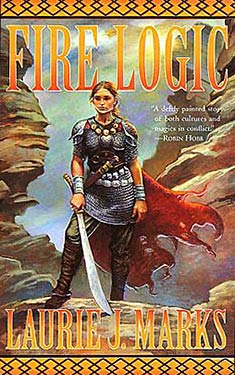Laurie J. Marks
Completed 3/23/2019,
Reviewed 3/24/2019
3 stars
Most of the
fantasy I’ve read is high fantasy, urban fantasy, and other common
subgenres. This was what I guess could
be called low fantasy. There are no
kings, elves, fairies, or fantastical magic.
This book was a gritty story about more or less everyday-type people
trying to make a difference in their world.
There’s a little magic, elemental as the title implies, but it’s very
fundamental, organic, and appears mostly by way of healers and seers, at least
in this first book of the Elemental Logic series. It won the 2003 Gaylactic Spectrum award for positive
LGBTQ content in SF/Fantasy, as did its sequel in 2005. But despite good writing, I found it hard to
follow where the author wanted to go with the plot. It had many moments, but they didn’t sum up
to a great whole.
 The book
revolves around characters in the country of Shaftal. It’s been invaded by the Sainnites. Zanja’s tribe was wiped out; she’s the only
survivor. She’s a fire elemental and a
lesbian person of color (Note: the book cover is whitewashed, sigh). Most of the
story is told from her perspective. She
meets and falls in love with Karis, a half-giant who is addicted to a deadly
drug called smoke. Karis is an earth
elemental, a metalsmith, and a powerful healer, but the drug is slowly taking
its toll. Zanja also meets Emil, a gay
officer fighting in the Shaftal resistance.
At one point, she joins Emil’s paladins on a guerrilla quest to route
the Sainnites from part of Shaftal. The story
is also told from Karis’ and Emil’s POV, but the majority of our experience of
them is through Zanja’s eyes.
The book
revolves around characters in the country of Shaftal. It’s been invaded by the Sainnites. Zanja’s tribe was wiped out; she’s the only
survivor. She’s a fire elemental and a
lesbian person of color (Note: the book cover is whitewashed, sigh). Most of the
story is told from her perspective. She
meets and falls in love with Karis, a half-giant who is addicted to a deadly
drug called smoke. Karis is an earth
elemental, a metalsmith, and a powerful healer, but the drug is slowly taking
its toll. Zanja also meets Emil, a gay
officer fighting in the Shaftal resistance.
At one point, she joins Emil’s paladins on a guerrilla quest to route
the Sainnites from part of Shaftal. The story
is also told from Karis’ and Emil’s POV, but the majority of our experience of
them is through Zanja’s eyes.
The
character development is quite amazing.
I really felt like I was in the skin of the three main characters. Most of the time we are in Zanja’s head. One of the most interesting things about her
is that she gets hurt in battle and once by the other paladins. She gets healed physically, but it takes time
to recover from the psychological damage done by the hurt. Karis’ character is also quite a
revelation. Her descent into oblivion
from smoke is devastating. The author did
a terrific job getting addiction down as well as the dangerous withdrawal from
it. Emil is great as Zanja’s guardian
and cheerleader. He’s also a scholar who
treasures books.
The part of
the book that baffled me was the main plot arc.
It didn’t seem to have a specific direction. I thought it just meandered with Zanja first
surviving her people’s holocaust, then meeting Karis, then joining Emil’s
paladins, and so on, until the end. I felt
like I was on her journey, but I didn’t know why. This made the book sometimes tough to get
through. The ending was pretty good, even
exciting, but I wasn’t sure how I really got there. Despite all this, the prose was stupendous. There were moments that were simply inspired,
and I enjoyed reading it. But again, I felt
like I didn’t know the reason we were on this journey.
I give the
book three stars out of four. It had all
the makings of a four star book, but in the end, I didn’t know how I had gotten
there. I’m still going to read the first
sequel, as it is an award winner and on my LGBTQ Speculative Fiction Resource
List on Worlds Without End. But unless the
second book has a stronger plot, I don’t think I’ll finish the series.
No comments:
Post a Comment